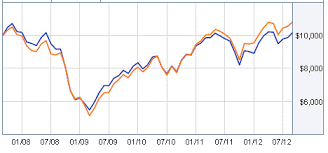Thanks to the new Fiduciary Rule, I believe that you’re going to see more index funds in 401(k) plans. However, that’s no surprise because that‘s the way we’ve been heading now for the past 15+ years.
When I first started in the retirement plan business in 1998, daily valued 401(k) plans were becoming a big thing. I think it helped that there was a big book in technology funds and everyone want to be in technology mutual funds as well as offerings from Janus. Of course, the dot bomb run in the market exploded in 2000. Index mutual funds were around and John Bogle from Vanguard was pushing its virtues, but the problem was that they were average and those technology mutual funds prior to 2000 had some eye popping returns. Thanks to that crazy market, index funds in 401(k) funds weren’t a big thing. Many plans offered an S&P 500 Index in their plan along with all actively managed funds.
There was also a strong bias against index funds because they didn’t pay revenue sharing and many actively managed funds did. Since there was no true fee transparency at the time, actively managed funds that paid revenue sharing were going to be more attractive to the plan sponsor who couldn’t tell the difference between a C share and an institutional share class. Thanks to the poor market returns and thanks to the embarrassing late trading mutual fund scandal, index funds started to get a better footing when people realized that 70% of the. Usual funds out there don’t meet their benchmarks over an extended period of time.
In addition, concerns about fees, revenue sharing, and investment returns spurred more interest in index funds. In addition, the proliferation of ERISA 3(38) fiduciaries helped because of one of their hallmarks in dealing with the added liability of having discretionary control over the fiduciary process is using index funds.
Now with the new Fiduciary Rule, you’ll also see more index funds being offered when all advisors working on plans are going to be considered fiduciaries. When brokers pushed actively managed funds, they were always concerned about the trails they received from specific funds. Now that they have to select mutual funds that are in their clients best interest, don’t be surprised you see many of them tout index funds because the broker has the added responsibility of being a plan fiduciary and a great way to manage that risk is using index funds that try to mimic the benchmarks. While index funds aren’t sexy in terms of returns, they’re a great thing for any advisor concerned with liability of being a retirement plan financial advisor.







